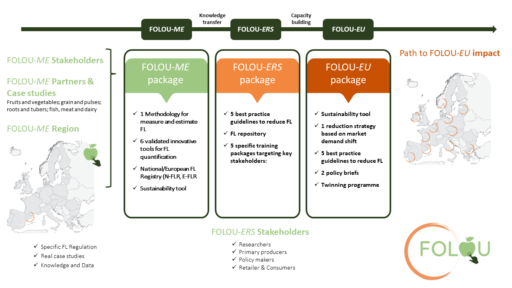In line with the EU Green Deal and the Farm to Fork strategy, FOLOU is willing to contribute to unlock the systemic transition of EU food systems by setting up the necessary mechanisms to:
Additionally, FOLOU will also work to assure the appropriate knowledge transfer and adoption of the project outcomes by the key targeted stakeholders: primary producers, retailers, consumers, policy makers and researchers.
FOLOU will structure its activities in a comprehensive action plan revolving around four levers of change:


METHODOLOGY FOR MEASURING AND ESTIMATING FOOD LOSSES FOR 5 MAIN COMMODITY CATEGORIES

ROADMAP FOR FL METHODOLOGY STANDARDIZATION

6 VALIDATED TOOLS FOR QUANTIFICATION OF FOOD LOSSES AT PRIMARY PRODUCTION STAGE.

NATIONAL FOOD LOSSES REGISTRY (N-FLR) AND EUROPEAN FOOD LOSSES REGISTRY (E-FLR)

FOLOU SUSTAINABILITY TOOL

STANDARD RESEARCH PROTOCOL FOR THE DATA COLLECTION OF THE FOOD LOSS DRIVERS

1 REDUCTION STRATEGY BASED ON MARKET DEMAND SHIFTS

5 BEST PRACTICE GUIDELINES TO REDUCE FOOD LOSSES

2 POLICY BRIEFS

FOOD LOSSES REPOSITORY

5 SPECIFIC TRAINING PACKAGES FOR KEY STAKEHOLDERS

TWINNING PROGRAMME FOR REGIONS
FOLOU will provide policy relevant information to achieve the mid-term goal of having food losses included in the EU regulations as has happened with food waste (e.g., EU Commission Decision 2019/1597), once in place, Member States have a maximum of two years to transpose it to its national regulations. Thus, FOLOU aims to contribute to that most of the 27 EU State Members are measuring/estimating food losses around year 2035.
This will help in setting up clear reduction targets, which currently does not exist because the lack of reliable estimations prevents formulating realistic reduction targets, and will definitely contribute in implementing the FOLOU strategies to significantly reduce food losses and mitigate its concomitant impacts.